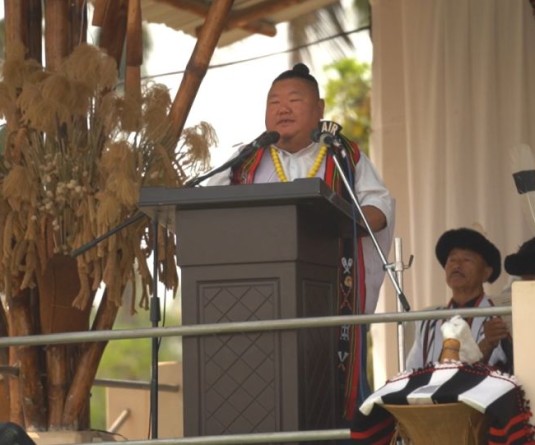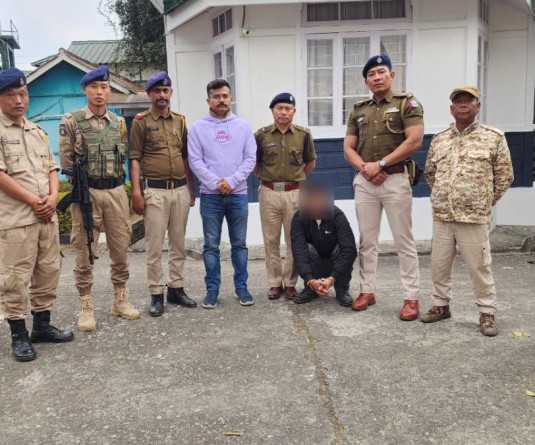
Advisor, IT&C Vikho-o Yhoshü giving away certificates to participants at the valedictory function of the ‘Workshop on e-Governance Project Life Cycle’ on May 27 last. (DIPR Photo)
Kohima, May 30 (DIPR): The five-day ‘Workshop on e-Governance Project Life Cycle’ held for the government officials which began on May 23 concluded on May 27 at ‘The Heritage’ Old DC Bungalow, Kohima. The workshop was organised by the Department of Information Technology & Communication with resource persons from the National Institute of Smart Governance (NISG).
Advisor, Information Technology & Communication, Vikho-o Yhoshü graced the valedictory function and said that e-Governance has great potential for improving the lives of citizens by ensuring transparency. Stating that mere formulation of IT strategy will not help delivery of quality services, he called for committed people to come forward to make it a reality. He called upon the participants to be the core people in the state to carry out the programme. He said that through e-Governance there is potential for creation of wealth and more jobs.
Vikho-o said IT department was created in 2003 and started functioning in 2004. He said IT department was earlier combined with Technical Education but subsequently bifurcated and now IT is combined with Communication. He said that the department is going ahead in its endeavours inspite of several disadvantages such as shortage of manpower etc. He said that the Department of IT&C is implementing the core projects in the state to develop infrastructural facilities such as the State Wide Area Network (SWAN), State Data Centre, Common Service Centres and building the State Portal. He said the Department is planning further development activities with new e-Governance facilities in the state. He later gave away Certificates to the participants.
Secretary IT&C, K.T. Sukhalu, IAS who also spoke in the valedictory programme said that Nagaland has passed the Information Technology Act to implement in the state for e-Governance. In this regard he urged all the departments to keep 3 to 5 percent of budget to implement e-Governance properly in their respective departments. Sukhalu expressed optimism that the State Data Centre at Kohima would be set up by July 2011. He said that out of the proposed 220 Community Service Centres (CSCs), 122 have already been rolled out. He also urged the participants to convince their respective heads of departments to expand e-governance policy in their department.
Experiences of the training were shared by Assistant Engineer, Industries & Commerce Er. Asenla Walling and Deputy Secretary, Finance, Kevin Zehol. They also requested IT Department to organise many more training on e-governance and proposed to nominate head of department in the future training.
It might be mentioned that during the five-day workshop participants were made to understand the whole process of e-Governance project life cycle. Highlighting key challenges and learning from the past, the resource persons also dwelt on project references for e-governance implementation in the country. Classroom exercise on service identification and prioritization and government process re-engineering were also taken up by the participants where the participants identified the departments’ services which could be taken up for re-engineering. The concluding session of the workshop on monitoring and evaluation was taken up by Professor J.C. Kapur, NISG.
Advisor, Information Technology & Communication, Vikho-o Yhoshü graced the valedictory function and said that e-Governance has great potential for improving the lives of citizens by ensuring transparency. Stating that mere formulation of IT strategy will not help delivery of quality services, he called for committed people to come forward to make it a reality. He called upon the participants to be the core people in the state to carry out the programme. He said that through e-Governance there is potential for creation of wealth and more jobs.
Vikho-o said IT department was created in 2003 and started functioning in 2004. He said IT department was earlier combined with Technical Education but subsequently bifurcated and now IT is combined with Communication. He said that the department is going ahead in its endeavours inspite of several disadvantages such as shortage of manpower etc. He said that the Department of IT&C is implementing the core projects in the state to develop infrastructural facilities such as the State Wide Area Network (SWAN), State Data Centre, Common Service Centres and building the State Portal. He said the Department is planning further development activities with new e-Governance facilities in the state. He later gave away Certificates to the participants.
Secretary IT&C, K.T. Sukhalu, IAS who also spoke in the valedictory programme said that Nagaland has passed the Information Technology Act to implement in the state for e-Governance. In this regard he urged all the departments to keep 3 to 5 percent of budget to implement e-Governance properly in their respective departments. Sukhalu expressed optimism that the State Data Centre at Kohima would be set up by July 2011. He said that out of the proposed 220 Community Service Centres (CSCs), 122 have already been rolled out. He also urged the participants to convince their respective heads of departments to expand e-governance policy in their department.
Experiences of the training were shared by Assistant Engineer, Industries & Commerce Er. Asenla Walling and Deputy Secretary, Finance, Kevin Zehol. They also requested IT Department to organise many more training on e-governance and proposed to nominate head of department in the future training.
It might be mentioned that during the five-day workshop participants were made to understand the whole process of e-Governance project life cycle. Highlighting key challenges and learning from the past, the resource persons also dwelt on project references for e-governance implementation in the country. Classroom exercise on service identification and prioritization and government process re-engineering were also taken up by the participants where the participants identified the departments’ services which could be taken up for re-engineering. The concluding session of the workshop on monitoring and evaluation was taken up by Professor J.C. Kapur, NISG.






